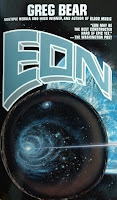The Stars My Destination (1956)
Alfred Bester (1913-1987)
244 pages
Alfred Bester’s rollicking science fiction novel “The Stars My Destination” features a brutally violent, though not entirely unsympathetic, anti-hero, Gully Foyle. As the story opens, an unknown event has left Foyle the only survivor in a heavily damaged spaceship floating through the asteroid belt. Confined to the one small closet of a room that remains intact, he has managed to survive for months by salvaging what he can, but with little hope of being rescued. Finally, some five months in, another spaceship does pass by, and when it responds to his flares by pulling close enough to see him, he can scarcely believe his luck. But then, a few moments later, the spaceship moves on without him, and his disbelief galvanizes into a reason to not only survive but to make it back home to Earth: revenge. And so the Foyle we are first introduced to as a dull, uncaring, unmotivated oaf, transforms into an obsessed demon, willing to endure anything, learn anything, do anything to wreak his vengeance on those in that passing spaceship who made the decision to abandon him to his fate.
Finally, some five months in, another spaceship does pass by, and when it responds to his flares by pulling close enough to see him, he can scarcely believe his luck. But then, a few moments later, the spaceship moves on without him, and his disbelief galvanizes into a reason to not only survive but to make it back home to Earth: revenge. And so the Foyle we are first introduced to as a dull, uncaring, unmotivated oaf, transforms into an obsessed demon, willing to endure anything, learn anything, do anything to wreak his vengeance on those in that passing spaceship who made the decision to abandon him to his fate.His first order of business, of course, becomes finding a way to escape the wrecked ship and find a way back to Earth. But, once he does finally make it home, he finds his plans for vengeance complicated by the social and political realities of his time.
Bester has set the story several centuries into our future, and imagines that humankind has spread throughout the solar system, including onto several moons of the outer system gas giants. In the decades before the story begins an earlier economic balance between the populations living in the inner system and those in colonies beyond the asteroid belt has been disrupted by the discovery of the ability of humans through a force of will to transfer themselves from one place to another instantaneously up to a range of 1000 miles – to “jaunte”, as it has come to be called, named after its accidental discoverer. The ability to jaunte has disrupted the economy in general, but most radically the balance that had existed between the inner and outer systems. The result has been, as the novel opens, years of ever intensifying war, a conflict Foyle had largely ignored but now inadvertently lands in the middle of when he returns to Earth to carry out his ruthless intent.
Nothing will deter him from his goal, however, and he executes his plans with a violence of purpose that shows no mercy, whether toward the guilty or anyone standing in his way, and up to and including innocent bystanders and even those naively inclined to help him. In fact, Bester largely provides readers with no clear lines of good and evil in his characters; he imagines a world filled with people aggressively pursuing their personal interests and with little sympathy for anyone else. Certainly Foyle, despite the justifying facts of his abandonment, remains a difficult protagonist to sympathize with, particularly as the body count mounts. And, given the forces arrayed against him, readers familiar with Moby Dick can be forgiven for wondering whether Foyle will, like Melville’s Ahab, find his obsessive quest a fatal calling.
Bester’s novel, written in the mid-1950’s, carries a distinct flavor and tone of the US of that time, projected a few centuries forward. This is particularly apparent in the company names Bester makes reference to in the story. Some of the companies mentioned were giants in the 1950’s, but have since lost their prominence, or haven’t survived at all to the present day, much less lasted centuries longer – an inadvertent reminder to readers of the transient nature of what seems ‘too big to fail.’
It is perhaps not surprising when reading a decades old science fiction story set only a couple-few centuries into Earth’s future to come across predictions by the author that haven’t panned out, or clearly won’t. As I discussed in my review last year of Greg Bear’s Eon, written in 1985, this can be distracting in some cases – central to Bear’s story, for example, is that the cold war between the US and Soviet Union continued into the 21st century. (My review linked to at right.)
In Bester’s story these corporate references initially set a mostly charming tone, reminders now of an overly idealized decade in US history, when at least one portion of the US population enjoyed a period of relative social stability and strong economic growth. As the story develops, however, the picture becomes darker, revealing the corporate leaders (apparently only men) of this future time to be essentially oligarchs, acting as a kind of nobility. They play a central role not only in the story, but, in fact, in ruling the solar system-wide society that Bester imagines. With the exception of the spy services, which seem largely independent of any control, the government exists only in the background of the story.
The oligarchs’ rise to power has coincided with the nearly complete submission of the general public into passive consumers, who are expected to enjoy what they are given in exchange for remaining docile and accepting of corporate control. Bester seems to anticipate that a trend already underway in the 1950’s, and certainly further advanced today, has seemingly come to complete fruition in the time setting of his novel.
The origins of this transformation lie in the immediate post-World War II period, when the era of the common man and the push of progressive populism that had characterized the pre-WWII political and social direction in the US and other democracies had been decisively crushed by corporate capitalist interests, as nicely summarized in a fascinating review of the life of composer Aaron Copeland on the radio program On The Media. By 1961, only ten years after Bester’s novel was published, President Dwight D Eisenhower would warn of the rise of the military-industrial complex as a threat to democracy in his presidential farewell address. And current day concerns about the impact of the wide-spread corporate collection of personal data for marketing purposes, and the related phenomenon of the advancing degeneration of politic campaigns and debates into marketing campaigns, only reinforce the plausibility of Bester’s dark vision.
But, having established this trend as continuing to a dystopian future, Bester hints toward the end of his story that Foyle’s very personal and private pursuit of vengeance may evolve into a window for social change, an opportunity to awaken the population from their compliant stupor in the face of corporate domination.
Foyle, who we are introduced to when the story opens as an unmotivated simpleton, becomes transformed by his quest for revenge, coming to recognize that the possibility exists for others to similarly take responsibility for their own lives, and so find ways to shake-off the yoke of their imperious masters. And so, late in the story, he demands that there be “no more telling the [common man] what’s best for them to know.… Let’em all grow up. It’s about time.” (235) In reply, one of the ruling elite objects that “we’re forced to seize the responsibility that the average man shirks,” and another adds that “you can’t trust people … they don’t know enough for their own good.” (236) But Foyle will not be gainsaid: “Then let him stop shirking it. Let him stop tossing his duty and guilt onto the shoulders of the first freak who comes along grabbing at it.” (236)
A demand applicable already in this current future we inhabit, much less Bester’s world of some centuries hence.
Other reviews / information:
 The quotes included in the last paragraph above from the ruling elites in the book – “We’re force to seize the responsibility that the average man shirks,” and “you can’t trust people … they don’t know enough for their own good.” (236) – have strong resonance with what Spanish philosopher José Ortega y Gasset wrote in his book from only a couple of decades earlier, in 1930. In The Revolt of the Masses he expresses just such concerns about the masses, and what he sees as the dire consequences of their suddenly rising up, as Foyle demands in Bester’s story:
The quotes included in the last paragraph above from the ruling elites in the book – “We’re force to seize the responsibility that the average man shirks,” and “you can’t trust people … they don’t know enough for their own good.” (236) – have strong resonance with what Spanish philosopher José Ortega y Gasset wrote in his book from only a couple of decades earlier, in 1930. In The Revolt of the Masses he expresses just such concerns about the masses, and what he sees as the dire consequences of their suddenly rising up, as Foyle demands in Bester’s story:the accession of the masses to complete social power … means Europe is suffering from the greatest crisis that can afflict peoples, nations, and civilizations. (11)
Have you read this book, others by this author, or even similar ones by other authors? I’d enjoy hearing your thoughts.
Other of my book reviews: FICTION Bookshelf and NON-FICTION Bookshelf


